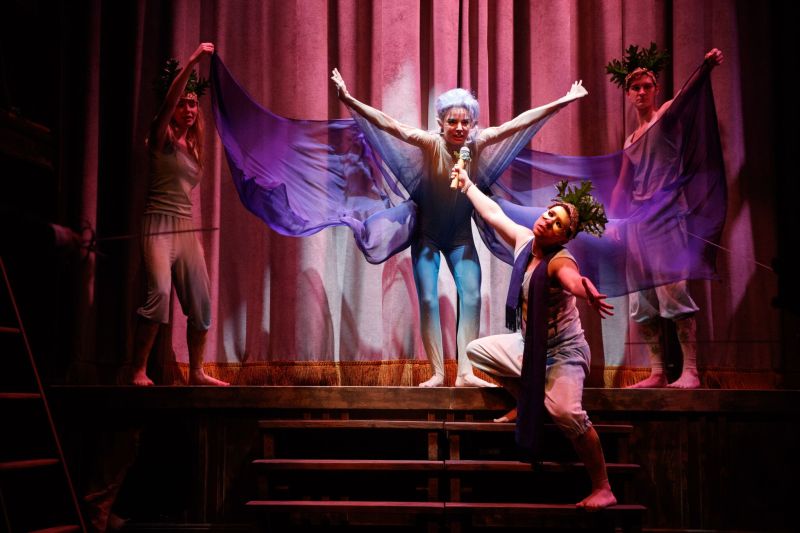A flash of lightning reveals a crew of sailors, frantically running across the stage. As thunder booms, these sailors fling themselves to the ground — right, then left — in a rhythmic yet unpredictable pattern. A lantern, barely lit, swings like a pendulum above their heads. Amidst the chaos, a woman stands on an unlit balcony, singing an operatic tune as if putting forth a steady wave of calm. Thus begins the TAPS production of Shakespeare’s “The Tempest,” with — you guessed it — a tempest. But this performance is anything but chaotic. Directed by Pulitzer Prize Playwriting Finalist Amy Freed and assistant directed by Abby Brooke (‘17), TAPS’s production conjures up a storm of near-magical student performances filled with lighthearted comedy, wondrous musicality, and the vagaries of the human experience.
This production is outright hilarious, with impromptu dance numbers, unabashed exclamations of “Freedom!” and fast-acting sleep spells. However, it also presents moments of seriousness with a father weeping for his lost son and a woman lamenting her life of servitude. The show’s brilliance largely lies in its ability to adeptly master the balance between comedy and realism.
On the surface, “The Tempest” is a somewhat discombobulated amalgamation of screwball antics and magical interventions. However, TAPS unmasks the illusions of the show through powerful soliloquies and provides a narrative which, at its heart, is about love and forgiveness. While the show at times relies heavily on overdone theatrics, with modern dance beats or conga lines of island spirits, it is nevertheless charming and brilliantly entertaining.
Tim Schurz (‘17) gives a spell-binding performance as Prospero the wizard, careful not to reduce his role to that of a stock character as he realistically vacillates between nurturing father figure, all-powerful wizard and forgiving human being. Schurz kneels to his daughter and takes her hands with paternal care as he explains how they came to be exiled on an abandoned island, but when his servant Caliban (Hamzeh Daoud ‘20) threatens to defy him, Schurz clamps his magical staff to the ground in anger, forcing Daoud, trembling, to the ground. Schurz’s commanding presence is augmented by his stentorian voice in addition to his tall stature, upright posture, and slow, confident strides. In his final scene, once he forgives the people — namely, his own brother Antonio (Noah Bennett ‘19) — who put him in isolation, he decides to give up his magic. In a closing moment of surrender, Schurz uniquely ends the show by extending his arms to the audience, as if inviting them to be “set free” with him.
Despite her character’s life of servitude, Lea Zawada (‘20) as Ariel is unabashedly free as she leaps, sways, and runs about the stage. Zawada’s energy is boundless, her stamina phenomenal. In accordance with her spirit-like character, she seems to be everywhere: singing, peering out from balconies, climbing down ladders, playing musical instruments. In one scene, Zawada gracefully flows across the stage, arms stretched like a ballerina, with a sense of fluidity which again emphasizes her spirit-like qualities. However, Zawada still finds the humanity within her somewhat inhuman character, especially in Act IV Scene I, when she turns to Schurz, wide-eyed, and asks: “Do you love me, master?” Similarly, in her final moment, after Prospero releases her from imprisonment, she takes a decisive moment to look back at him, at once displaying her character’s capacity to feel loss.
At the heart of the show lies the romance between the lovers Miranda (Emma Rothenberg ‘19) and Ferdinand (Miles Petrie ‘19). In their whirlwind, Romeo-and-Juliet style fling, Rothenberg and Petrie forge youthful innocence and hope throughout the show. As the show progresses, so does their relationship and comfort with one another. Their distance onstage diminishes as they become like one entity, holding hands, united by a vow of marriage.
The technical elements of the show afforded its smooth sailing and seamless transitions. Created by scenic designer Erik Flatmo, the set’s understated nature provides a simple atmosphere which juxtaposes the foolery happening onstage. The set itself, complete with two balconies on either side, mirrors an abandoned Jacobean-esque theater and adds a traditional element to this show, underscoring Prospero’s long exile as well as the timeless nature of this forgiveness-centered show. Lighting and sound voard operators (Ashi Agarwal ‘19 and Susannah Meyer ‘19) work expertly during storm scenes, coordinating flashes of light and booms of thunder to create a sense of foreboding within the storyline.
With buoyant characters and underlying realism, TAPS’s production weathers the test of time. Though a difficult show to tackle, the cast and crew does so with vigor and enthusiasm. This story begins with a storm, but it ends on a sense of calm, with only Prospero standing center stage. The calm after the storm seems to be an inversion of the colloquial saying, but perhaps what the show is suggesting is a sense of hope. There is always forgiveness, always love, always patience — come hell or high water.
Contact Alli Cruz at allicruz ‘at’ stanford.edu.
